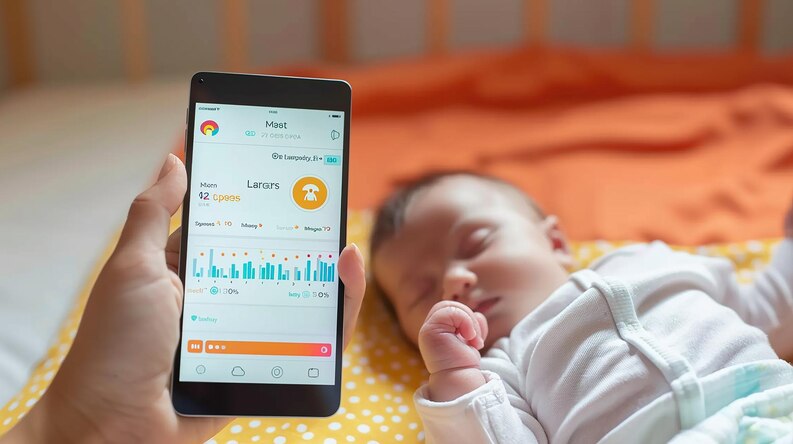It can be a lot to take in and monitor when you are a first time parent for a baby’s health. Infants have such a delicate temperature, hydration and movement system to protect themselves in the very first few months of life a minor illness as perceived to a parents will probably not have any intervention if one becomes serious. This is the reason we see an infant lifecycle tracker idea get spread like wildfire. Parents can monitor and provide precision care with ease, at the click of a parent’s thumb with smart technology tracking and analyzing health metrics in real-time.
According to the Canadian Pediatrics Society, more than 30% of parents experience high levels of anxiety regarding their infant’s health in the first six months. Infant health tracking tools aim to reduce this stress by providing timely, accurate insights right at their fingertips.
Baby Health Tracker
A baby health tracker is more than just a digital thermometer or a diaper log. It’s an integrated system that keeps a record of vital health metrics such as:
- Body temperature
- Wet diapers and bowel movements
- Sleep duration and quality
- Feeding patterns
- Physical activity
These devices can store historical health data, enabling pediatricians and caregivers to identify trends and spot potential concerns early. For example, maintaining a consistent record of body temperature could reveal signs of fever before the baby becomes visibly ill, an important function, as fevers in babies under 3 months require immediate medical attention.
Studies show that consistent tracking of baby’s diaper output can help identify hydration issues or digestive problems early. This is especially critical for premature babies or those with underlying health risks. By leveraging baby health trackers, parents gain better control and understanding of their child’s health development over time.
Infant Tracker App
Modern-day parenting has gone mobile, and so have infant monitoring systems. An infant tracker app enables seamless connectivity between the physical tracking device and a parent’s smartphone. With intuitive dashboards, daily reports, and real-time notifications, these apps make it easy to monitor everything from feeding times to movement alerts.
A 2022 parenting tech report by BabyCenter revealed that over 68% of new parents in North America use at least one baby-related app within the first six months. These apps not only support caregiving routines but also provide educational tips, symptom checkers, and reminders for vaccination appointments and wellness visits.
What sets the best apps apart is personalization. They adapt to the baby’s health history and routine, offering tailored suggestions and actionable insights a far cry from generic parenting advice.
Baby Activity and Health Tracker
Baby activity and health tracker that monitors actively the one that actively keeps data, with both being monitored and evaluated on overall baby wellness. These trackers offer a holistic look of the infant’s physical health from quantifying movement in sleep to measuring reaction to feed.
In the end, most if not all trackers have accelerometers that can detect strange movements suggesting your baby might be upset, gassy or bouncing back and forth through W wake/sleep cycles. Others encourage parents to watch the baby sleeping position, as SIDS remains a leading worry for bed-sharing baby parents during those first 12 months.
This kind of information is extremely important for working parents or any career that demands regular checkups away. They send real-time alerts so that they can take immediate action on the illness readings and reduce time in response to be there for the baby even though letting him/her stay alone.
Infant Healthcare
The field of infant healthcare is evolving quickly, thanks to wearable technology and IoT innovations. These tools now enable early detection of symptoms, reduce unnecessary clinic visits, and promote at-home monitoring for high-risk or premature babies.
Infants, especially those under 3 months, cannot communicate their discomfort or health issues making advanced monitoring solutions crucial. For example:
- Temperature monitoring helps avoid hypothermia or fever spikes.
- Hydration tracking via diaper sensors can catch early signs of dehydration.
- Location alerts protect babies from rolling into dangerous areas.
Smart infant healthcare solutions are not designed to replace medical professionals; they are tools to support parents with real-time insights and enhance early intervention capabilities.
The Infant Health Tracker That Grows with Your Baby
When it comes to reliable, real-time infant health monitoring, Tiny Track offers a comprehensive solution that seamlessly aligns with the concept of a modern infant health tracker. Designed for babies in their most delicate stages, Tiny Track is a lightweight, washable gadget that attaches to diapers and transmits live data to a parent’s smartphone.
It offers:
- Instant alerts for changes in body temperature
- Notifications when the baby urinates or defecates
- Movement and proximity alerts if the baby rolls too far or near danger zones
- Programmability based on specific medical conditions
Tiny Track is a baby health tracker and also a baby healthcare POC with just a little bit more. It enables parents with data-based decisions so that they can better understand and respond to what their baby is trying to tell them. Tiny Track follows your baby no matter if you are at home with them, while you are traveling or while sleeping, it is a must for any modern parent to have this on board.


